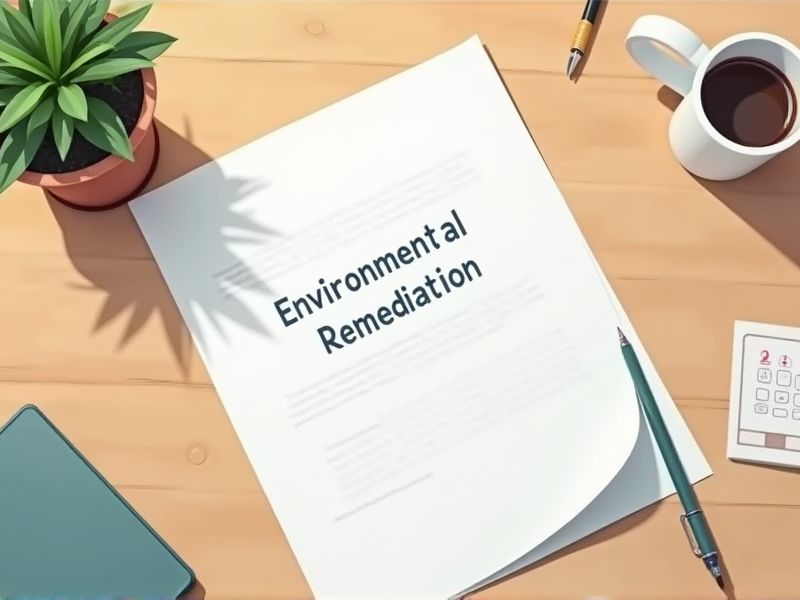
Environmental Remediation Managers are crucial in managing and restoring contaminated sites, necessitating specialized knowledge and skills. They must have certifications to ensure compliance with governmental regulations and industry standards. These credentials validate their expertise in risk assessment, pollution control, and site recovery methods. Key certifications are essential for an Environmental Remediation Manager.
Certified Environmental Professional (CEP)
The role of a Certified Environmental Professional ensures adherence to environmental regulations and standards, minimizing legal risks during remediation projects. Experience and training reflected in the CEP designation enhance project efficiency and sustainability through informed decision-making. Their specialized knowledge aids in accurate site assessments and the design of effective remediation strategies. Qualified professionals build credibility with stakeholders, facilitating smoother project approval and community support.
Certified Hazardous Materials Manager (CHMM)
The Certified Hazardous Materials Manager (CHMM) credential equips professionals with comprehensive knowledge of regulations, ensuring that environmental remediation projects comply with legal and safety standards. Possessing a CHMM certification demonstrates a high level of expertise in identifying and managing potentially dangerous substances, mitigating risks during cleanup efforts. An Environmental Remediation Manager with CHMM certification effectively manages and supervises remediation activities, optimizing safety and efficiency. The credential verifies the manager's ability to implement best practices in hazardous materials management, leading to more successful project outcomes.
OSHA HAZWOPER Certification
An Environmental Remediation Manager must obtain OSHA HAZWOPER Certification because it ensures they understand safety protocols when handling hazardous substances, reducing the risk of workplace accidents. Compliance with OSHA standards is mandatory for legal reasons, as failure to adhere can result in hefty fines and project shutdowns. Certification arms managers with the latest knowledge on dealing with emergencies specific to hazardous waste sites, enhancing operational efficiency. It boosts credibility and trust among stakeholders, facilitating smoother project approvals and collaborations.
LEED Accredited Professional (LEED AP)
LEED Accredited Professionals bring specialized knowledge in sustainable practices, which enhances an environmental remediation manager's ability to implement eco-friendly solutions. The recognition of a LEED AP credential often leads to increased credibility and trust among clients and stakeholders seeking sustainable development. LEED APs possess skills in energy efficiency and resource management, which are critical in mitigating environmental harm during remediation projects. Access to the extensive LEED network allows environmental managers to stay updated on the latest sustainable technologies and practices, improving project outcomes.
Certified Industrial Hygienist (CIH)
A Certified Industrial Hygienist (CIH) is essential for an Environmental Remediation Manager because their expertise in identifying and evaluating hazardous substances ensures safe work environments. Their risk assessment skills help in developing strategies to minimize exposure to toxins during remediation projects. A CIH's knowledge in regulatory compliance ensures that all environmental and safety standards are met, avoiding legal penalties. Their ability to implement hazard control measures enhances the effectiveness and efficiency of remediation efforts.
Certified Environmental Auditor (CEA)
Environmental remediation managers must ensure compliance with stringent regulations, and a Certified Environmental Auditor provides the expertise needed to navigate these complex legal frameworks efficiently. Auditors assess current environmental practices and identify potential risks, enabling managers to implement targeted remediation strategies. CEA certification ensures auditors have the specialized knowledge required to evaluate environmental compliance comprehensively. Certified auditors also enhance credibility with stakeholders, facilitating more effective project approvals and implementation.
Project Management Professional (PMP)
A Project Management Professional (PMP) certification enhances an Environmental Remediation Manager's ability to efficiently plan and execute complex cleanup projects within defined timelines and budgets. Heightened organizational skills from PMP training lead to improved risk management, ensuring environmental hazards are anticipated and mitigated effectively. PMP-certified managers can better coordinate multidisciplinary teams, facilitating clear communication and collaboration among scientists, engineers, and regulatory bodies. The credential boosts credibility, often required to gain stakeholder trust and comply with industry standards and environmental regulations.
Certified Safety Professional (CSP)
A Certified Safety Professional (CSP) ensures adherence to stringent safety regulations during environmental remediation, minimizing risks and preventing workplace accidents. Understanding complex environmental laws and safety protocols mitigates potential liabilities associated with hazardous materials. Expertise in hazard assessment enables effective risk management strategies, ensuring safe project execution. Possessing a CSP credential enhances credibility and trust with clients, aligning remediation efforts with industry safety standards.
Six Sigma Green Belt Certification
A Six Sigma Green Belt certification provides Environmental Remediation Managers with a structured methodology to identify and eliminate inefficiencies in complex remediation projects. Understanding statistical analysis helps in managing environmental data more effectively, leading to improved decision-making. The certification equips managers with skills to enhance project timelines and reduce costs, directly impacting project success rates. Organizations value Six Sigma training as it aligns with sustainable practices, driving compliance with environmental regulations and standards.
Risk Management Professional (RMP)
Engaging a Risk Management Professional (RMP) helps an Environmental Remediation Manager accurately assess and anticipate potential environmental and safety hazards, ensuring projects are completed within regulatory compliance. The RMP contributes to the identification of financial risks associated with remediation projects, safeguarding against unexpected cost overruns. By employing structured risk management methodologies, the RMP enhances decision-making processes, leading to more effective and timely remediation strategies. Collaboration with an RMP promotes continuous improvement, fostering adaptive strategies in response to evolving environmental challenges.
Summary
When you obtain certifications as an Environmental Remediation Manager, your expertise in managing and implementing environmental cleanup projects is recognized, potentially increasing your job opportunities and career advancement. These credentials can lead to enhanced project outcomes, as they demonstrate your proficiency in industry best practices and innovative techniques. Organizations often view certified professionals as more trustworthy, which can lead to increased project funding and stakeholder confidence. Holding certifications may also positively impact your network within the environmental sector, opening doors for collaboration and learning.
